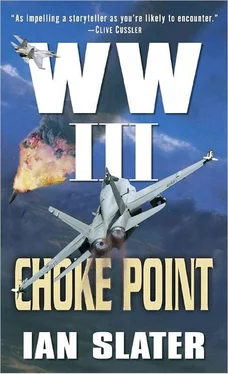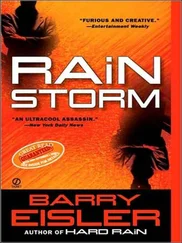Given his pain, David found talking difficult, and his tone was uncharacteristically apologetic. “One or two places—” he told the general. “Splinters. It’ll mend.”
“Witch doctors tell me you’re finished for combat.”
“That’s what they think. I need to get my hands on an—” He winced with the effort. “—on an F2000.”
Freeman merely nodded, his manner affirming nothing more than that he was familiar with the revolutionary Belgian assault rifle. Designed for the new world disorder in which a soldier one minute might be a U.N. policeman helping to maintain enough order to distribute food in some drought-ravaged third world country, and in the next be engaged in a vicious firefight with rebels, the 5.56mm weapon had been designed to accommodate snap-on, snap-off modules for different situations and to accommodate these modules quickly and easily. In this way, the F2000 avoided having many of the fixed add-ons that gave so many other modern weapons a “Christmas tree” look. There were other snap-on, snap-off assault weapons, but Freeman knew immediately why David was hoping for the ergonomically designed Belgian piece. The F2000 was not only well-balanced and easy to carry, but was “ambidextrous amenable” in both firing and carrying mode, the cocking handle being on the left of the receiver. The relatively light — less than eight pounds — twenty-seven-inch-long rifle was especially suited for combat in Central Asia. In this vast region, where weapons themselves were under constant assault by the fine grit of dust storms sweeping out of the Gobi and other deserts, the F2000, whose access points, including its cocking slot, were sealed, was the natural choice.
“It doesn’t look pretty,” said Freeman. David thought the general meant his bandaged arm, until he continued, “But it’s compact and does the job. Clip-on grenade launcher. Thirty-round M16 pattern mag.”
“Yes.”
There was an awkward pause, David ending it with, “Has a fire control system they say is foolproof.”
Freeman grunted. “Whenever they say a thing’s foolproof, you’d better start looking for the fool.”
David laughed, but it was forced, both men veteran comrades in arms using their natter about the F2000’s specifications as a stand-in for the subject they were both avoiding. It was distinctly un-Freeman-like to step around painful questions. Indeed, it was his unflinching willingness to confront unpleasant situations head on that had contributed in no small measure to his legend in both the military and Washington, D.C. The wounded Medal of Honor winner wondered how long the general could hold his fire.
“Started exercising?” asked Freeman.
“Yes. Trying to cut down on the pain pills.”
“Don’t, if they help you get through exercises. Knew a guy once — would never take pills. Rambo type. Thought he was going to win the game all by himself. But couldn’t fit into the team. Wouldn’t pass the ball.”
“Uh-huh. Know the type. Remember—”
“Wouldn’t take pain pills,” cut in Freeman. “Not even a damn aspirin. Thought it was wimpy. Being a sissy. Out on an exercise one night up at Fort Lewis, he got a goddamn headache from the howitzer batteries uprange. Must’ve been a migraine. Wouldn’t take a pill. Got so damn disoriented by this migraine, saw the steps, made so much noise going through the brush, couldn’t concentrate, and gave the whole squad away. Reds nailed us before we could hit the kill house.”
“Steps?” asked David.
“What? Oh, yes. Steps going up in front of you like a serrated castle wall. It’s called the ’castle’—an aura a lot of migraine sufferers see before an attack, distorts their vision. Usually the steps come with a background of green — most beautiful damn green you’ve ever seen. You take the pills then , you’ve got a chance of beating the headache or at least reducing the severity—”
The general stopped, the abruptness confirming what Brentwood had already realized. “You suffer from them, General.”
Freeman, the soldat extraordinaire , or what his enemies called “soldier eccentric-aire,” nodded. “Never told anyone that before. Strictly between you, me, and the gate post. Understood?”
“Of course.” It had been the best the general could do in approaching the as yet hidden subject of his visit, delaying the unasked question by dredging up the story of the man who wouldn’t take medication and of how he himself was a secret migraine sufferer. It was a kind of “I understand pain too” quid pro quo. So now he could ask the question, soldier-to-soldier. Seven commandos in. Six commandos dead.
“So what went wrong, David? You fuck up?”
David moved awkwardly in the bed and, pulling out his bedside table drawer with his good left hand, unscrewed a smoke-grenade-size vial and lifted it to his mouth, swallowing two more Oxycodone.
“That bad, eh?” said Freeman, taking the vial from him, screwing the top back on, dropping it into the drawer.
“It was a shoelace,” said David cryptically.
“ Shoelace ? You starting a quiz program? What the hell does that mean? You tripped, fired your weapon, is that what happened?” He paused. “Blue on blue? That what we’re talking about, David?”
“No, sir, I didn’t shoot my own men. Though I might as well have.”
“Hey!” snapped the general. “I don’t want any sniveling cry-baby, mea culpa, poor-me, self-pitying shit. What’d I tell you boys — all my boys? Look at it square on. You’ve always stood up. Taken full responsibility. Goddammit, I wrote you up for the gong. Saw the President pin it on your chest, remember? But taking responsibility isn’t the same as making a clear analysis. I haven’t read the goddamn AAR.” He meant the After Action report. “I’m retired , remember? Bastards don’t let me see anything ’cept the damn USO schedule — when some blond big tits is going to work up the boys so they spend the next week beating their meat ’stead of keeping their mind on the job. All I know is that seven of my boys went out and six didn’t come back. What went wrong? What’re the AAR’s ’Lessons Learned’? We’re gonna be in this godforsaken place for years, no matter what the White House says. Stuck here and in the other six Stans. Same in Iraq. What can we learn from your experience, Captain?”
David explained about the shoelace — the damn German tenor — how it was that Jamal got ahead of him as they’d run for the entrance.
“So that accounts for why this Jam got it instead of you. Nothing else.” Before David could reply, the general asked, “You think Li Kuan was there?”
“I don’t know, General. Light was pretty bad. Didn’t see any pockmarked guy.”
“But you think they were waiting for you?” the general pressed. “A trap?”
David shrugged, his legs relaxing, the Oxycodone giving him a buzz. “We spotted one sensor. Could’ve missed others, maybe tripped one.”
The general nodded, gazing out at the Hindu Kush. “Lost your confidence?”
David’s forehead creased. It made him look much older, puzzled. “I don’t know. Sometimes I think no. Other times—”
“At night?” said Freeman, turning around.
“Mostly,” replied David.
“Don’t think too much. Set an exercise goal — push yourself harder every day but don’t use it as penance. Channel it for Operation Payback.”
“Haven’t heard of that.”
“Neither have I,” said Freeman, “but it’ll come. You heard about the Chinese — going into Kazakhstan after the terrorist staging areas?”
“Saw a bit on CNN.”
Freeman pulled out a khaki handkerchief and began roughly polishing the goggles he habitually wore in the region. Wrapped around the old khaki Afrika Korps cap — a gift which, like the goggles, had been passed down from one of Rommel’s staff — the goggles made him look like the famed Desert Fox himself, especially when he rode in one of the open Afghanistan Humvees, standing up and using the.50 caliber machine gun as an armrest that vibrated noisily as the vehicle sped across the Afghan plain.
Читать дальше












